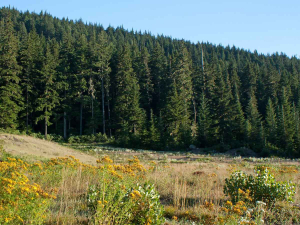ETS costs cut 66% for forest owners – McClay
Additional reductions to costs for forest owners in the Emissions Trading Scheme Registry (ETS) have been announced by the Government.
 New research led by a University of Canterbury academic has identified that conventional seed banking alone isn’t enough to conserve all of New Zealand’s endemic plants.
New research led by a University of Canterbury academic has identified that conventional seed banking alone isn’t enough to conserve all of New Zealand’s endemic plants.
New research led by a University of Canterbury academic has identified that conventional seed banking alone isn’t enough to conserve all of New Zealand’s endemic plants.
Dr Sarah Wyse, who lectures in the School of Forestry at the University of Canterbury (UC) says protection of the environment is the first line of defence for plant conservation with the preservation of native plant species in artificial seedbanks - known as ex situ conservation – as an important backup.
Her team’s research shows that 80% of New Zealand’s woody plant species can be successfully preserved using conventional seed banking, in which seeds are dried and frozen for long-term storage.
This accessible process can be undertaken by conservation groups and citizen scientists outside of laboratories as it doesn’t require specialized equipment or expertise.
However, seeds from some plants – especially New Zealand’s tall forest trees, with large bird-dispersed seeds, cannot be successfully conserved this way.
“Tropical rainforest seeds shed while they’re metabolically active so they can germinate quickly, but this makes them more problematic as you can’t dry or freeze them,” says Wyse.
“New Zealand has a number of trees closely related to tropical rainforest species, and these are the ones that may prove tricky,” she explains.
Conservation of these seeds requires more complex techniques such as cryopreservation, in which the seed embryo or other plant tissues are stored in liquid nitrogen. Currently, little is known about how to perfect that process of New Zealand native seeds.
Wyese says some of the forest taonga (treasures) that may pose difficulties for artificial seedbank construction include dominant canopy trees such as rimu, kohekohe, swamp maire, kahikatea, tōtara, and kauri.
As these species face additional threats from predation, pollinator extinction, climate change, and pathogens like myrtle rust and kauri dieback, effective ex situ conservation is critical.
While gaps in existing knowledge are concerning, Wyse says she is encouraged by the number of organisations committed to seed conservation.
In Canterbury, this includes Māori biosecurity initiative, Te Tira Whakamātaki, who bring significant mātauranga (Māori knowledge) to the field. She also notes a growing interest in seedbanks from arboretums and botanical gardens.
Dr Wyse’s research, coauthored with Thomas Carlin, Thomas Etherington, Aisyah Faruk, John Dickie, and Peter Bellingham, is published in the journal Pacific Conservation Biology.
The research was funded by a grant from the Ministry of Business, Innovation and Employment through New Zealand’s Biological Heritage National Science Challenge.
Additional reductions to costs for forest owners in the Emissions Trading Scheme Registry (ETS) have been announced by the Government.
Animal welfare is of paramount importance to New Zealand's dairy industry, with consumers increasingly interested in how food is produced, not just the quality of the final product.
Agriculture and Forestry Minister Todd McClay is encouraging farmers and growers to stay up to date with weather warnings and seek support should they need it.
The closure of SH2 Waioweka Gorge could result in significant delays and additional costs for freight customers around the Upper North Island, says Transporting New Zealand.
OPINION: The year has started positively for New Zealand dairy farmers and things are likely to get better.
Ministry for Primary Industries (MPI) Director General Ray Smith believes there is potential for an increase in dairy farming in New Zealand.

OPINION: If the hand-wringing, cravat and bow-tie wearing commentariat of a left-leaning persuasion had any influence on global markets, we'd…
OPINION: With Winston Peters playing politics with the PM's Indian FTA, all eyes will be on Labour who have the…